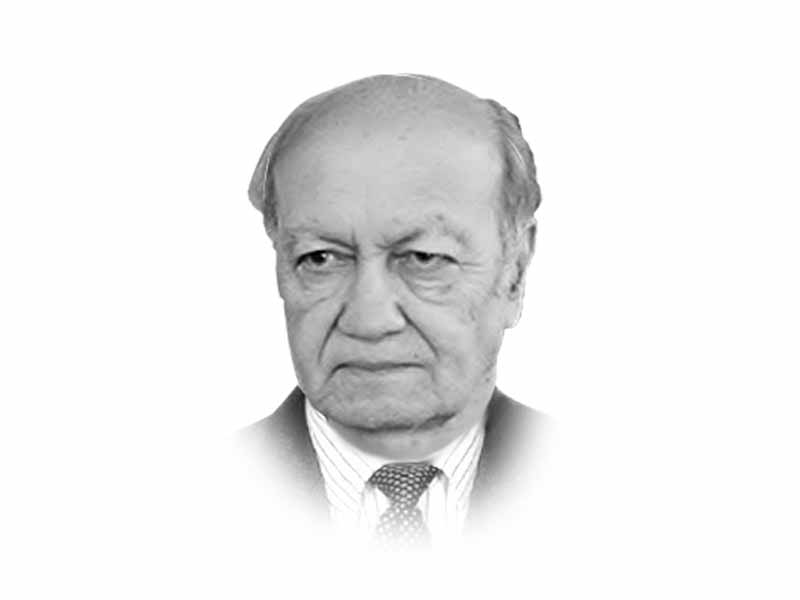
However, what is worrying is that there is very little effort to raise the professional capabilities of the police force in both urban and rural Sindh so that they contribute effectively in maintaining law and order, and over a specific period of time, take over the responsibility of doing so. One is aware of the huge challenges that Karachi’s policing demands, but perpetuating the emergency approach of using Rangers is surely not the answer. The Karachi police have suffered in terms of efficiency and morale due to their misuse by certain politicians all in a bid to advance petty political objectives. Their induction and promotions, in many instances, have not been on the basis of merit, but patronage. Reliance on the Rangers will have to continue, but a timeline of two to three years should be set for their gradual replacement. Indefinite reliance on Rangers defeats the very concept of normality and proper functioning of a state. In the long term, this also erodes the authority of the provincial government. Using Rangers in this manner also ignores the fact that their primary function is to defend the eastern border, train for operational employment and perform area security duties during wartime.
Similar longevity may await military courts if the failings that led to their establishment are not addressed soon. Terrorism-related cases were being subjected to inordinate delays in civilian courts. Moreover, even in instances where cases were tried, the courts failed to prosecute terrorists because judges feared retaliation. Prosecution lawyers and witnesses also feared for their lives. But with the lax attitude of the government towards legal reforms and no signs of beefing up the security of judges, prosecutors and witnesses, military courts, too, are likely to become a permanent feature.
Since the insurgency started taking root in Fata in 2007, successive governments have looked at the problem mostly through the security prism and generally ignored other major contributing factors of its spread. As of now, the military has cleared most terrorist sanctuaries from Fata and is now in the holding phase. According to the army chief, the ongoing military operation in North Waziristan is planned to continue until the remaining 20 per cent of the area is brought under full control of the state. The government is supposed to introduce major reforms and a new template for the governance structure is to be established, which reflects the aspirations of the tribal people. The incursion of the Taliban and collapse of the jirga system in certain areas demand that the present mode of running the affairs in Fata, through the political agent, should change sooner rather than later. An even more challenging task is the introduction of economic, political and social reforms on a priority basis. These should be based on consensus and coalitions that have a credible backing of all major stakeholders with constitutional and legal safeguards that can be sustained over time. The task of rehabilitating internally displaced persons should be accorded a high priority as well. More importantly, the people of Fata should be the managers of their destiny and agents of change. Otherwise, the influence of a regressive clergy will continue to dominate and the TTP and other militant groups could return. Regrettably, the civilian government has yet to assume responsibility for development and administration and seems content in outsourcing this responsibility to the military.
Imran Khan has repeatedly demanded that elections be held under army supervision. It is a sad state of affairs that a democratically-elected leader has no faith in civilian institutions — bureaucracy or the judiciary. All fair-minded people will endorse the call for fairness in elections, a central precondition for throwing up true representatives for parliament. But the fundamental point is that instead of emphasising the need for strengthening the Election Commission of Pakistan and the electoral process, Imran Khan falls back on taking the shortcut of seeking assistance from the military. If countries in our neighbourhood, India and Sri Lanka, are managing fair elections, there is no reason why our country should not address the shortcomings rather than keep drawing in the military in professionally unrelated matters.
The prime minister, too, takes most policy decisions on major foreign, defence and security issues in one-to-one meetings with the army chief. This adhoc approach not only goes against the basic principles of good governance and democratic norms, but also has far-reaching implications, as our historical experience reminds us. Our decision to support the Taliban in Afghanistan was taken for short-term gains and has cost us heavily. Instead of Pakistan becoming the hub for cross-border trade and beyond, ideally located as it is, we continue to struggle in normalising relations with Afghanistan and India. Even today, while apparently we have no desire for the Taliban to gain power in Afghanistan, some elements in Pakistan continue to consider using them as leverage.
These are some of the examples that illustrate our checquered history where military rulers and even elected politicians have taken crucial decisions without weighing their long-term consequences for the nation. Institutionalised decision-making improves the quality of national decisions, is critical for strengthening democracy and ensures a more peaceful future. It is also the route to correcting the civil-military imbalance and enhancing the power potential of the country, not to mention that there would be less justification for apologists to harp on that ‘all institutions are on the same page’, as people will see the change for themselves.
Published in The Express Tribune, November 25th, 2015.
Like Opinion & Editorial on Facebook, follow @ETOpEd on Twitter to receive all updates on all our daily pieces.













COMMENTS (6)
Comments are moderated and generally will be posted if they are on-topic and not abusive.
For more information, please see our Comments FAQ